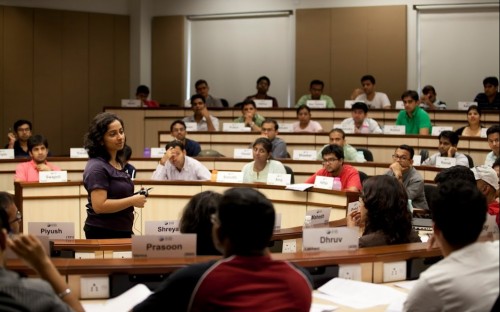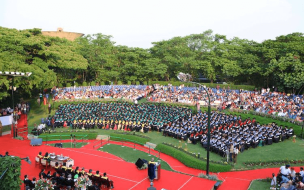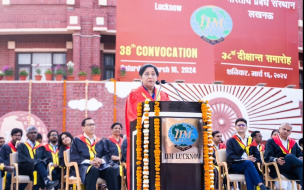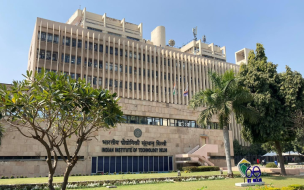The region has the largest youth population in the world and at one point graduates could be expected to walk into any MBA job. Yet after spending thousands on a business education, many Indians are struggling to find work or report salary decreases. And some find their degrees are less valuable.
Those considering business schools in India will have noticed they are spoilt for choice. Last years’ MBA cohorts took the GMAT entrance exam in record numbers, an 11 per cent increase on the previous year. India is the third biggest GMAT taking region in the world.
Yet they have almost three times as many business schools as continental Europe. In fact, India is now home to more than a third of all schools in the world.
A Two-Tier System
These figures are deceptive, however. They fail to account for quality of institution, says Amit Karna, an Academic Director of EBS Business School. “There is a sharp decline in the quality of education beyond the top institutes. This leads to blurring of quality differences. And it is difficult to gauge the quality differences between students of average institutes,” he says.
There are just three of the 3,000 Indian business schools featured in the main MBA rankings, which rate the top 100 MBA programs in the world. The U.S has more than 50; the UK has more than 10.
The 3,000 schools can be categorized into four different tiers, says VK Menon, Senior Director of Admissions and Careers at the Indian School of Business, the second highest-ranked school in India. “There are premium schools, and then there are second-tier, third-tier and fourth-tier schools. The market is segmented and there are various schools catering to different sectors,” he says.
ISB, he says, cater to top consulting and technology firms like the Boston Consulting Group and Microsoft, while lower-tier schools do not achieve such recruiting success.
Amit from EBS, which is highly ranked in India, suggests that there should be more accreditation to regulate the sector. “I believe that with more accreditation and quality certification, this is likely to get further structured in the years to come,” he says.
Other commentators have suggested that the vast amounts of schools in India are the result of a money-spinning proposition. And it is fair to say that business schools are also businesses.
Increased Competition
With such a surplus of MBA graduates in India, fewer students from outside the region want to study there. There was only an 8 per cent increase in demand for India as a study destination last year, compared with around 20 per cent in other emerging business school destinations such as Australia and Canada, according to QS Top MBA.
Management education in India could cost anything between $15,000 and $28,000, and many students take loans to pay their fees. Yet it is becoming harder to see a return on their investment.
More MBA graduates mean more competition for the top jobs, says Anish Jain, who graduated from the MBA program at ISB in 2011. “The corporate finance industry is very small and the numbers of openings that reach MBA candidates are even lesser,” he says.
“If you are gung-ho to get a job in M&A, investment banking or private equity, then you need to have strong functional skills and great contacts in the industry.”
Amit from EBS agrees. He says that the job market competition is enhanced by the proliferation of private schools in India. “There is increased competition when it comes to finding a job post your MBA. But in general, the students from top schools have a good market,” says Amit.
VK says that ISB have no problem finding their MBA students jobs, in the domestic or international market. “Students who graduate from the top-fifty schools would have plentiful choice, but as you go down the line, there could be pressure at the middle or bottom end of the structure. But with premium schools, there is no issue at all,” he says.
But why are so many Indian citizens scrambling to get into MBA programs, even if there is no guarantee of a job at lower-ranked schools? The answer can be found in the country’s economic growth, says VK.
India is an emerging economy and has in recent years enjoyed healthy economic expansion. “There is growth in the technology sector and manufacturing sector and the requirements [for jobs] is fairly MBA heavy,” he says.
Amit has a different view. The huge enrolment numbers make sense for a country with such a huge population, he says. It is also easier to get into many MBA programs in India; less work experience is required than in the West, and there are less undergraduate business programs.
“One can argue that lack of PG options in other fields have often forced applicants to make a beeline for business schools,” Amit says. “Due to the dearth of undergrad programs, many of these business schools recruit not only fresh graduates, but those from engineering, science, commerce or arts backgrounds.”
Anish, who now works at a leading energy company, says you need “determination, hard-work and careful preparation” to get into a top Indian MBA program. As the population goes up, so too will competition for places, he says.
It is clear, then, that those in top-ranking schools may be considered better placed to find jobs. Mohandas Pai, a former head of human resources at Infosys, the leading software company, agrees. “I feel sorry for those kids. I feel sorry for the money their parents have spent because they're not getting anything in these lower rung institutions,” he said.
Economies slowing, one BRIC at a time
But when it comes to MBA salaries, Indian graduates have to settle for less. Last year was considered dull for recruitment and many commentators blame a slump in the country’s economic growth. “2013 was quite sluggish as far as economic growth in India is concerned, and therefore I am not surprised that recruitment and salaries were dull in 2013,” says Amit.
VK says that as you go down through the business school hierarchy, there will be more pressure felt. Yet, Indian citizens who graduated from full-time two-year MBA programs reported a starting salary of just $34,988 last year, according to a report compiled by GMAC. Most European MBAs earn more than $100,000 per year.
Although India’s economic growth has slowed, business schools are hopeful that political elections this year will speed up expansion. “There is likely to be an upward trend in economic growth that will translate into more jobs, and therefore more interest in MBAs,” says Amit.
VK says it depends on each sector. He expects India’s technology industry to grow, which would offer MBAs product management and program delivery roles.
Although highlighted as the most competitive, VK also points to the financial services industry as a potential boon for MBAs this year. “Consulting and strategy consulting, and finance and operations are the big three sectors,” he says.
“They would be the stable sectors, not growing so fast, but making a comeback to MBA hiring.”
Both MBAs and business schools will look to the elections in a few months’ time, hoping that if a strong majority government comes to power, the tide will begin to turn.
RECAPTHA :
e1
3e
89
69








